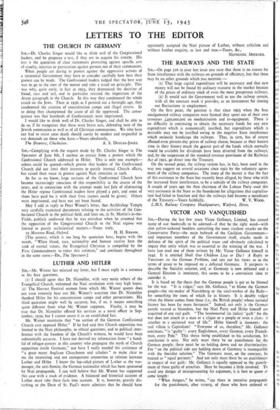THE RAILWAYS AND THE STATE
Sia,-011 page 516 in your last issue you state that there is no reason for State interference with the railways on grounds of efficiency, but that there may be on other grounds which you mention :— (i) That large capital expenditure will be necessary and that new money will not be found by ordinary recourse to the market because of the prices of ordinary stock of even the most prosperous railways.
(2) It would suit the Government well to use the railway system, with all the constant work it provides, as an instrument for ironing out fluctuations in employment.
On the first point, the position is that since 1923 when the four amalgamated railway companies were formed they spent out of their own resources £45o,000,00o on modernisation and re-equipment. There is no difficulty in continuing to obtain the necessary funds for any new expenditure which is economically justified, but expenditure which is desirable may not be justified owing to the negative State interference which seriously handicaps the railways. That, in turn, has of course affected even present-day prices of railway shares, because at their busiest time in their history much the greater part of the funds which normally would be available for dividends have been diverted from the railways, and, by the suspension of the standard revenue provisions of the Railways Act of 1921, go direct into the Treasury.
On the second point, the railway system has, in fact, been used in the way you suggest on several occasions since 1922 by the voluntary agree- ment of the railway companies. The irony of the matter is that the fact of this assistance to the State has recently been alleged, by those who wish for increased State interference, to be a subsidy of the railway companies. A couple of years ago the then chairman of the Labour Party used this very assistance tZi the State as the foundation for allegations that capitalisa- tion had failed to function and that the railways hat' become a mendicant of the Treasury.—Yours faithfully, W. V. WOOD. L.M.S. Railway Company Headquarters, Watford, Hens.


























 Previous page
Previous page